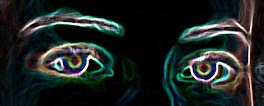
I have been well-trained enough in the systematic, emotionless analytical process of academics to at least separate myself from the deep affectations of films. However, with Downfall my line of defense was demolished. This film showcases its brilliant power in the same manner that a subtle piano sets the mood for a despairing night alone in some forsaken pub of the movies--you could not point to its direct effects, but its swift, precise execution nails you to the floor of your insides.
As an aspiring filmmaker, I could not imagine a more difficult subject: Hitler. He was a deity to his followers, a monstrosity to the world...and a kind employer to his secretary. Seeing his final days through her access to the Fuhur-bunker revels a Hitler no one wants to see: a man. Through careful, informed, intentional film making, director Oliver Hirschbiegel retrieves Adolf Hitler from the recesses of "extreme data" and "inhuman-ness" to the realm of reality, a depraved human being responsible--like all other human beings--for how he treats his fellow men. His psychotic breaks, his mad delusions, they do not put him on a pedestal of shame discrete from human guilt. Hirschbiegel had the discernment to realize that showing Hitler's mania would not excuse what he did--it would emphasize his culpability.
He kept a subjective objectivity by careful framing. When he showed Hitler's hands shaking with anxiety, the camera lingered in close-up just long enough before swinging back through the doorway and encompassing the entire room. Hitler's face would fill the screen as he presided over military meetings, indicating his weight and authority; but the generals standing next to him created a claustrophobic, constraining space within the frame. Early in the film, as reference before, Hitler's entrances and exits were accompanied by sweeping camera tracking; by his final days, every time we see him, he is caged: standing in a door frame or around a tight corner in his labyrinth of hallways. As Roger Ebert confessed, we being to feel the kind of "sympathy we feel for a rabid dog [that we know] must be destroyed."
The most distinguishing characteristic of this film was its duel accusation and sympathy. Even in his crippled state, Hitler obviously held sway over people. But as people, they should have exercised their discernment and wisdom in acknowledging the truth. Time and again through snippets of drunken conversation, whispered or shouted challenges, and sweeps of hands over foreheads, their innate repulsion struggled for a voice. But each time it is silenced, they dip their hands in Hitler's blood-drenched Pilate's bowl. The most poignant, unhinging example of this phenomenon was Frau Goebbels: after painstakingly, swiftly murdering her six children, she sinks to the floor outside the room--then exits the room and sits down to a game of solitaire: absolutely alone. This contrasts most painfully with her embarrassingly moving hysterics at Hitler's decision to commit suicide.
Bringing the film to completion, Frauline Traudl Junge testifies on camera: there is no excuse--even being young.

